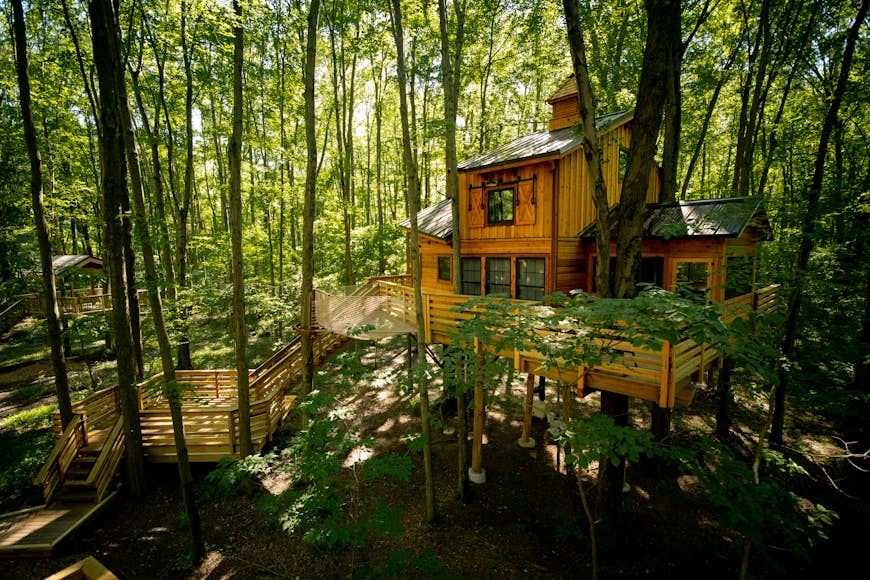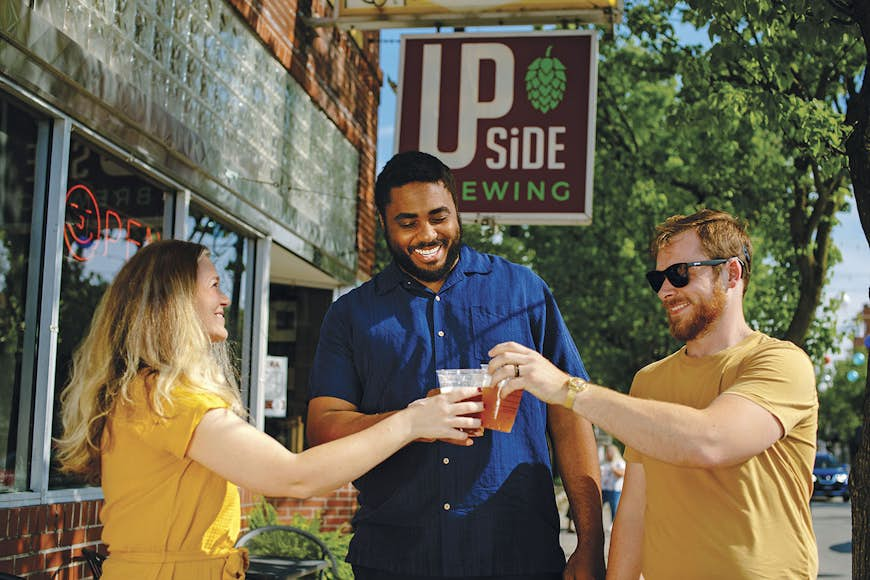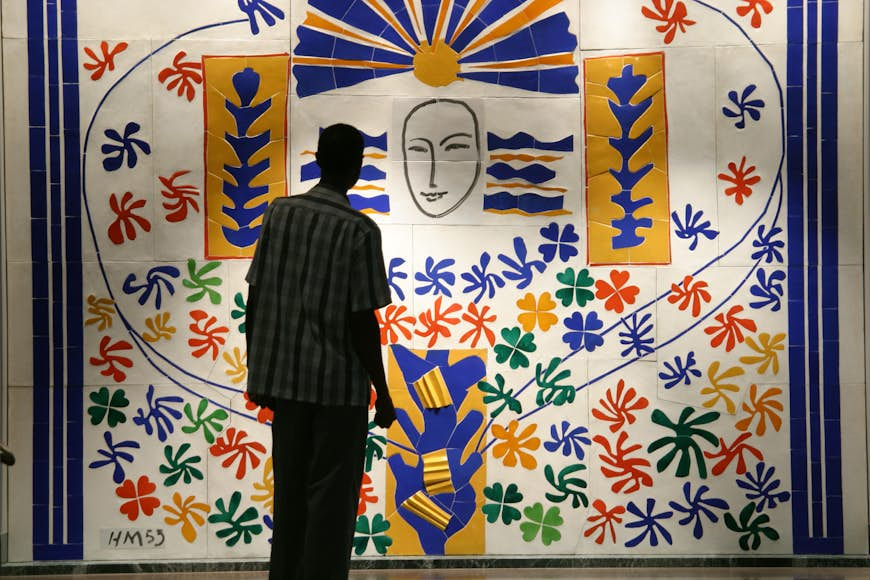Once seen a postindustrial city on the decline, Toledo, Ohio has recently undergone a metamorphosis, transforming into one of the most dynamic places in the Midwest.
The unexpected and surprising city has gone by many nicknames throughout the years. The best known are the Glass City, thanks to Toledo’s history of glass production, and Frogtown, a reference to the massive wetland known as the Great Black Swamp that the city was built upon.
During the 1800s and 1900s, Toledo became a major hub of commerce and manufacturing, coming close to overtaking other Great Lakes cities like Cleveland in population. Unfortunately, the city never recovered from the 1973 recession, and for decades saw ongoing losses of jobs and population and a rise in crime.
When I was growing up in Toledo during the 2000s, things were pretty dismal. The city was littered with empty strip malls and abandoned homes, and rounds of job layoffs were continuous. One year, my high school’s Homecoming was canceled because of a neo-Nazi riot that sadly put Toledo in the national news. I used to hate Toledo – and would avidly scream this sentiment from any mountaintop I could find.
Yet even despite my tough history with the city…I amazed that Toledo has undergone a renaissance in the last decade. Local coffee shops, chef-driven restaurants, fantastic bike trails and even a new national museum have turned Toledo into a city I honestly never thought it could be.
When you visit Toledo’s fascinating mix of new and old attractions, you’ll feel the appeal of a true underdog story. Expect to be greeted by locals (my family included) who are eager to show off their often-overlooked town.
Here are a few reasons to visit Toledo right now.
View some of the world’s best art (for free!) at the Toledo Museum of Art
You don’t need to fly to Europe to see the work of Mondrian, van Gogh, Monet and Renoir. Housing 30,000 works of art, the Toledo Museum of Art is one of the best art museums in America.
The main building was originally constructed in 1912, when Toledo’s was an economic powerhouse. With its Greek Revival design, it was intended to be the Crown Jewel of Toledo, proving the city was a world-class destination that could rival other Great Lakes metropolises like Detroit and Chicago. Giant columns, marble floors and ornate archways adorn the museum, creating a sense of opulence, wonder and awe.
Most inspiring of all, the museum is always free, making it perfect for travelers of all budgets.
Find out why Toledo’s Warehouse District is part of TV history
Twenty years ago, downtown Toledo wasn’t much to write home about, with abandoned buildings and empty streets creating a derelict and depressing scene. Today, it’s one of the hottest neighborhoods in the city. Cracked sidewalks and smashed windows have been replaced by couples wearing Lululemon walking their dog to a local coffee shop. Downtown’s revitalization is a source of pride for Toledoans and it’s likely that everyone will tell you to check it out.
The busiest part of downtown is the Warehouse District, just south of the baseball stadium and hockey arena. Here you’ll find many of Toledo’s best and most popular restaurants, including the chef-driven sushi establishment Kengo and the Mediterranean-inspired Souk, which uses herbs and vegetables from its own garden to craft healthy, delicious and vibrant dishes. But most famous of them all is Tony Packo’s.
Opened in the 1930s, Tony Packo’s gained fame for its delicious Hungarian hot dogs, and has been a Toledo institution ever since. In the ’70s, Toledo native Jamie Farr starred in the hit series M*A*S*H; his character, Corporal Klinger, regularly mentioned Tony Packo’s, giving the restaurant international fame. It’s guaranteed that locals will tell you to eat at Tony Packo’s. (Expect to hear a lot about M*A*S*H on your visit.)
Tony Packo’s is also home to a very unique tradition: autographed hot dog buns. In 1972, an employee asked him an autograph from Burt Reynolds, who had dropped in for a visit. Reynolds grabbed the closest thing he could find – a hot dog bun – and signed it. To this day, it remains a tradition for famous diners to sign a bun when eating here, and the establishment now has the autographs of six presidents, along with those of celebrities like Jerry Seinfeld, Bing Crosby, Alice Cooper and more.
Get lost in the forest without ever leaving the city
Toledo has over a dozen Metroparks, preserves akin to state parks that offer a natural environment for the area’s local plants and animals. Each one is different and special based on its location, making them all ideal for outdoors enthusiasts,. Since Toledo’s natural landscape spans everything from lakesides to rivers, swamps, meadows and forests, each park feels completely different from the others.

The city’s most popular park, Wildwood is located in West Toledo and is full of dense woods, meadows full of wildflowers, swamplands and even a historic mansion now preserved as a museum. On the south side of town is my favorite Metropark, Side Cut along the Maumee River. Here, you’ll find fishermen, kayakers and even the remains of old locks that were once part of the Miami and Erie Canal. It also has a 5-mile-long bike trail along the river that I absolutely love. If you have a mountain bike as I do, you can head even further into the park, pedaling along unpaved trails that by ponds filled with herons and turtles, and past shaded paths often frequented by deer.
The most notable Metropark is Oak Openings. Hailed by the Nature Conservancy as one of the “last great places on Earth,” Oak Openings contains a multitude of biomes all within a short distance of each other. From oak savannas to wetlands, it’s one of the most biodiverse places in the world, with over a hundred rare species living within the park. In 2019, a treehouse village opened, where visitors can picnic during the day and even stay the night, sleeping among the trees and the stillness and darkness of the woods.
For anyone who enjoys hiking, biking, paddling, fishing, birding or just a pleasant walk outside, the Metroparks are an absolute must.
Take a walk along Toledo’s boozy Ale Trail
Toledo may be best known as the home of Jeep, but it also has an emerging brewery and distillery scene. A new bar crawl, dubbed the 419 Ale Trail, takes people on a self-guided journey through the city’s most notable watering holes.
Highlights of the trail include the Maumee Bay Brewing Company, one of Toledo’s oldest operating breweries. Opened in the mid-’90s, long before the craft beer revolution took hold, Maumee Bay is a casual space with exposed brick walls and a pub vibe. Patrons come for excellent ales, lagers, stouts and even hard ciders, along with great pub fare like fried pickles and giant pretzels. The crowd tends to be varied, with coworkers enjoying after-work drinks mingling alongside college kids taking a break from studying.

One of Toledo’s newest breweries has also quickly become one of the city’s most popular, as well as an Ale Trail favorite. Earnest Brew Works has two locations in the city – but their South Toledo brewery is the must-visit. It’s hard to resist beers with names like “My Tart Will Go On” and “Hoppy Camper.” What’s more, food trucks line up in the parking lot and one end of the 1.5-mile-long Chessie Trail is located across the street, making Earnest a fun conclusion to an evening walk or bike ride.
Discover Toledo’s surprisingly rich history
Toledo’s complex history often surprises even the most avid history buffs. Many in the region already know the Glass City for its association with that industry – and Libbey, one of the world’s largest glass manufacturers, still operates a large factory in town to this day. But Toledo began playing an important role in history long before the era of international commerce.
In the 1800s, Fort Meigs, located just across the bridge in Perrysburg, was the site of various battles in the War of 1812 and served as the meeting place for the Treaty of Fort Meigs, which gave the US control over Northwest Ohio. Nowadays, the massive wooden fort remains preserved and open to visitors (especially local Boy Scout troops). Weekly events could include blacksmithing workshops, nighttime lantern tours and battle reenactments. In October, the famous ghost walks describe the fates of soldiers whose spirits have yet to leave Fort Meigs.
On the other side of town, Heritage Sylvania is a historic park that’s dedicated to conserving Toledo’s past. On its premises are many preserved historic buildings including an old train depot, schoolhouse and, most significantly, the Lathrop House, which was used as part of the underground railroad.
The Lathrops, along with a few of their trusted friends, would bring people escaping from slavery to the house using a false-bottomed carriage. The home even has a secret area in its fireplace that was accessed through the kitchen’s oven, once used for hiding the escapees if visitors arrived. Today, the house is open for tours and hosts special educational events.
Other locations showcasing Toledo’s history include the Wolcott House (where President Obama once delivered a speech) and The Manor House at Wildwood Metropark, both of which are open for tours and showcase daily life in Toledo during the 1800s and early 1900s.
The Docks is the best dining spot in town
Overlooking the Maumee River, directly across from downtown Toledo is a district filled restaurants catering to every taste. On any given night in the Docks, you’ll see locals celebrating special occasions, couples having a romantic date night and businesspeople wooing clients. Weather permitting, be sure to reserve an outdoor table (every establishment has a few). As well as Instagram-perfect views of the Toledo skyline, you’ll see locals pulling their boats right up to the Docks for a walk along the river or a cocktail. A riverside trail and sand volleyball courts right next to the restaurants create an excellent sense of community and fun.
Highlights include the Real Seafood Co., a popular New England–style seafood restaurant; Zia’s, an Italian restaurant specializing in family-style dining; El Vaquero, one of Toledo’s most popular Mexican restaurants; and the newly opened Hamburger Mary’s, which dishes up delicious burgers along with glittery drag shows, drag brunches, drag bingo and more.
The guacamole at El Vaquero is fantastic, but my go-to is the miso-glazed sea bass at Real Seafood. My family goes out to eat here at least once every time I’m in town because there’s something incredibly special about eating great seafood along the waterfront.
Go on a family outing to Toledo Zoo

Every Toledoan grew up visiting the Toledo Zoo during school field trips, weekend family outings and summer camps. During the holidays, the entire city comes out for the zoo’s Lights Before Christmas celebration, when seemingly every tree, bush and building in the zoo is decked out in over a million Christmas lights.
The zoo has over 10,000 animals, and is especially known for its stunning polar bears, its recently renovated aquarium and the Tembo Trail, which houses African animals like lions, elephants and hippos. In fact, the Toledo Zoo was ranked as the best zoo in the country in 2014.
If you visit during the warmer months, be sure to check out the summer concert series in the zoo’s outdoor amphitheater. From ZZ Top to “Weird Al” Yankovic, a wide variety of acts headlines every year. Because the zoo is so popular with local families on weekends, visiting on a weekday will offer a much more relaxed environment.
Hop aboard a freighter at the National Museum of the Great Lakes
Since Toledo sits on the shores of Lake Erie, one of the five majestic Great Lakes, the entire region is soaked in maritime culture. And on Toledo’s east side across the street from the Docks is the National Museum of the Great Lakes.
The new museum celebrates and honors the history of the lakes, tells the stories of some of its most well-known ships and pays remembrance to the numerous lives lost on the lakes, known for producing some of the most erratic and intense storms in the country.
The highlight is relics recovered from the SS Edmund Fitzgerald. Once the largest ship on the Great Lakes, the Edmund Fitzgerald sank under mysterious circumstances, shocking the sailing community and cementing itself in local lore forever.
Next to the museum building is the SS Col. James M. Schoonmaker, a 617ft-long lake freighter that transported iron ore, coal and grain across the lakes from 1911 to 1980. Today, guests can climb aboard the permanently docked vessel and walk through the crew areas, kitchen, engine room, captain’s quarters and even the enormous cargo hold.
Spend the afternoon in picturesque Perrysburg
Just across the river from Toledo is the small town of Perrysburg, a relaxed and quaint community of 21,000 people. Louisiana Ave is the main street and is lined with beautifully restored historic buildings housing cafes, restaurants, boutique shops and bars. Favorites include fine dining at Stella’s, the retro gaming store Flotsam Games and Collectables, and locally owned Maddie & Bella coffeehouse.
Surrounding Louisiana Ave are neighborhoods filled with historic homes and small parks, giving the town a storybook feel. The 577 Foundation is an old farmstead property transformed into a welcoming and beautiful community space and botanical garden. Their monarch-butterfly-hatching program is really special: get up close to butterfly cocoons and, if you visit between mid-June to mid-October, watch them hatch, with new hatchings every day.
As well as diverse green spaces, you can explore an apiary, a log cabin from the early 1800s and a trail that winds its way down to the river. On top of the natural beauty, 577 hosts weekly events like cooking classes, knitting workshops and pottery groups. Part garden, part park and always a refuge from the city, it’s a unique and special place.
